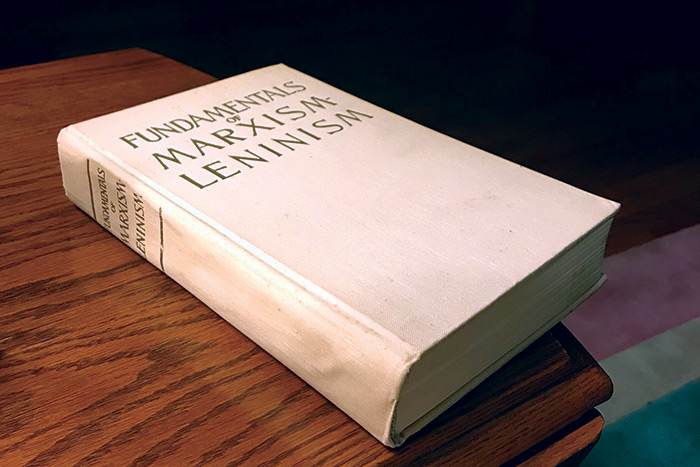An Old Book on Communism and the Bright Future Ahead

Many local people here live in homes that have been passed down for generations. Interesting stuff turns up. The founding families of the towns here go back to the 17th century: Hildreth, Strong, Hallock, Corwith. Their descendants are among us today.
Recently, after dinner at the home of one of these families, we sat in the library where, up on a shelf, I came across a book—between Situations by John Paul Sartre and Union Power and the Public Interest by Dr. Emerson Schmidt—titled Fundamentals of Marxism-Leninism: Manual. I asked if I could browse through it and they said sure. So I did.
It was a hardcover book, nearly 800 pages, published by the state-run Foreign Languages Publishing House in Moscow in what was then the U.S.S.R. An introduction stated this book was a manual, originally in Russian, explaining the Marxist-Leninist world outlook, then translated into 20 languages for distribution around the world to urge comrades to join the Communist Party. World conquest by the Communists was writ large throughout. There was no middle ground.
There were those who espoused Capitalism and Colonialism. And then there were Communists. With Communism, all the people—the intellectuals, the peasants and the workers, as the book put it—shared in the largess of society equally. With the other, the rich got richer and the poor got poorer. It would be a fight, and one had to defeat the other. The publication date was 1961.
Chapters bore titles such as “Bankruptcy of Bourgeois Sociology,” “The General Law of Capitalist Accumulation,” “The Marxist-Leninist Party and Its Role in the Workers’ Class Struggle” and “Aggravation of the Problem of Sovereignty in the Era of Imperialism.”
At the end was a chapter about what to expect after the Communists won. I thought it astonishing and of interest today—particularly in a section on science.
In this chapter, the academician V.A. Obruchev, the well-known Soviet scientist, reflecting on what people have a right to expect of science, wrote:
“It is necessary:
“to prolong man’s life to 150–200 years on the average, to wipe out infectious diseases, to reduce non-infectious diseases to a minimum, to conquer old age and fatigue, to learn to restore life in case of untimely, accidental death;
“to place at the service of man all the forces of nature, the energy of the sun, the wind and subterranean heat, to apply atomic energy to industry, transport and construction, to learn how to store energy and transmit it, without wires, to any point;
“to predict and render completely harmless natural calamities: floods, hurricanes, volcanic eruptions, earthquakes;
“to produce in factories all the substances known on earth, up to the most complex protein—and also substances unknown in nature; harder than diamonds, more heat-resistant than firebrick, more refectory than tungsten and osmium, more flexible than silk and more elastic than rubber;
“to evolve new breeds of animals and varieties of plants that grow more swiftly and yield more meat, milk, wool, grain, fruit, fibres, and wood for the needs of the national economy;
“to reduce, adapt for the needs of life and conquer unpromising areas, marshes, mountains, deserts, taiga, tundra, and perhaps even the sea bottom;
“to learn to control the weather, regulate the wind and heat, just as rivers are regulated now, to shift clouds at will, to arrange for rain or clear weather, snow or hot weather.”
The book ends with this:
“It goes without saying that even after coping with these magnificent and sweeping tasks, science will not have reached the limits of its potentialities. There is no limit, nor can there be any, to the inquiring human mind…to put the forces of nature at his service, to divine all nature’s secrets.
“What a boundless field of activity will be open before communist society. The advance to the shining heights of communist civilization will always engender in people unusual power of will and intellect, creative impulses, courage and life-giving energy.”
Well, they lost.









